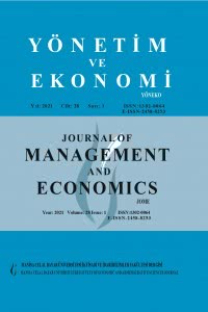Genişlemelerle Birlikte Avrupa Birliği Bakanlar Konseyi’nde Oylama Gücü Dağılımı
Avrupa Birliği, Lizbon Antlaşması, Banzhaf güç indeksi.
Genişlemelerle Birlikte Avrupa Birliği Bakanlar Konseyi’nde Oylama Gücü Dağılımı
European Union, Treaty of Lisbon, Banzhaf power index.,
___
ESKİCİ, H. B. (2011), Türkiye’nin AB Üyeliğinin Oylama Gücü Dağılımına Etkisi, Yüksek Lisans Tezi, Hacettepe Üniversitesi, Fen Bilimleri Enstitüsü, Ankara, 112s.GELMAN, A., KATZ, J. N. ve TUERLINCKX, F. (2002), “The Mathematics and Statistics of Voting Power”, Statistical Science, 17 (4), 420-435.
GÖKBUNAR, R., YANIKKAYA, H. ve CURA, S., (2008), Avrupa Birliğinin Türkiyeli Geleceği; Umutlar ve Korkular, Nobel Yayın Dağıtım.
KAEDING, M., SELCK, T.J. (2005), “Mapping Out Political Europe: Coalition
Patterns in EU Decision-Making”, International Political Science Review, 26 (3), 271-290. KODAKCI, D. (2004), Genişleme, Avrupa Birliğinde Demokrasi Eksikliği ve Çözüm Önerileri, Uzmanlık Tezi, Avrupa Birliği Genel Sekreterliği, Ulusal Program Dairesi, Ankara, http://www.abgs.gov.tr/files/Uzmanl%C4%B1k%20Tezleri/devrim_kodakci.pdf. (02012).
KÓCZY, L. Á. (2012), ” Beyond Lisbon: Demographic trends and voting power in the European Union Council of Ministers”, Mathematical Social Sciences, 63 (2), 152–158. Math-it, http://math-it.org/Mathematik/MathPol/BanzhafJApplet.html. (10.02.2011).
ÖZLER, Z., MİNDEK, C. (2008), AB’ de Anayasa Süreci ve Lizbon Antlaşması, İktisadi Kalkınma Vakfı Yayınları, İstanbul, 87s.
PLECHANOVOVA, B. (2010), “The EU Council enlarged: North–South–East or core–periphery ?”, European Union Politics, 12 (1), 87-106.
SINDLEROVA, K. (2010), “Political Economy of the EU’s decision-making process: the impact of the future enlargement on the power distribution in the EU”, International Scientific Ph.D. and Post Docs Conference 2010.
TANNENBAUM, P. (2004), Excursions in Modern Mathematics, Fifth Edition, Upper Saddle River, NJ : Pearson Education, 645p.
The Lisbon Treaty (2009), The Readable Version, Third Edition, Foundation For EU Democracy, http://en.euabc.com/upload/books/lisbon-treaty 3edition.pdf. (10.02.2011).
- ISSN: 1302-0064
- Yayın Aralığı: Yılda 4 Sayı
- Yayıncı: Manisa Celal Bayar Üniversitesi İktisadi ve İdari Bilimler Fakültesi
Para Talebinin Belirleyenleri ve İstikrarı Üzerine Bir Uygulama: Türkiye Örneği
Varant yatırımcısının volatilite algısına etki eden faktörler: Bıst'de ampirik bir uygulama
Bankacılık Sektörü Hisse Senedi Endeksi İle Enflasyon Arasındaki İlişki: Yedi Ülke Örneği
Spor Kulüpleri Performanslarının Hisse Senedi Fiyatlarına Etkisi: BIST’de Bir Uygulama
Türkiye’de Mali Yerelleşmenin Boyutları ve Ölçümü Üzerine Bir Değerlendirme
Genişlemelerle Birlikte Avrupa Birliği Bakanlar Konseyi’nde Oylama Gücü Dağılımı
Hatice Burcu ESKİCİ, Özgür YENİAY
Türkiye’de İkinci Basamak Sağlık Hizmetlerinde Hekim Performansı ve Bir Uygulama
Erhan DEMİRELİ, N. Mine TÜKENMEZ, Kadir YILDIRIM, Ayten ÇELİK
Siparişe Dayalı Üretim İçin Ürün Gruplarının Oluşturulmasında Genetik Algoritma Tabanlı Bir Yaklaşım
Şevkinaz GÜMÜŞOĞLU, Nedret ERBOY, Güzin ÖZDAĞOĞLU
Çalışanların Örgütsel Güven ve Sinizm Algılarının Örgütsel Bağlılıkları Üzerindeki Rolü
Tolga TÜRKÖZ, Mustafa POLAT, Serkan COŞAR
Kafkasya'nın ekonomik potansiyeli ve dönüşümü için politika ve stratejiler
